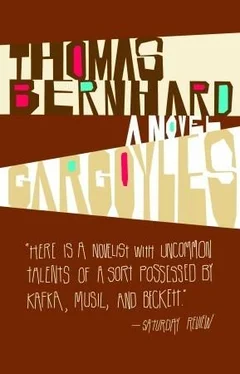I could see that someone had just been sitting in the large gray-green velvet upholstered easy chair near the sickbed. A neighbor woman? A relative? Whoever it was had been reading to her and had probably gone to the village to do some errand.
These houses are occupied by solitary old women who have been abandoned by their children and have restricted themselves to a minimal life. Entering such houses, I always feel close to suffocation. Flowers by the window in a long-necked glass vase; canary in a cage, eating and chirping heedlessly.
Underwear is no longer hidden, pain is no longer hidden, the sense of smell is dulled, there is no longer any reason to conceal frailties one is alone with.
My father simply walked into the bedroom. He woke the sleeping woman by rattling the birdcage with his stethoscope so that the flustered bird chirruped in alarm.
The smiles of such women who know they are done for and who wake from sleep to find that they are still in this painful world — these smiles are nothing but horror.
Now lying words are exchanged. My father speaks of the summery weather spreading over the entire countryside, of the colors everywhere. He has brought his son along, he says.
I approach the woman, moving into the gloom, then return to the easy chair. I pick up the book and sit down. The Princess of Cleves , I think, The Princess of Cleves in Stiwoll. I leaf through the book thinking: What kind of person is this patient lying here? Who was her husband?
All about the walls I notice large photographs of a bearded man, surely a schoolteacher; all the photographs show the same schoolteacher’s face emerging from a huge beard.
Then my father alludes to her husband the schoolteacher, and talks about the change in weather and what a pity that people cannot make use of this change in weather, because it has come too late.
He talks about common acquaintances in Gratwein, in Übelbach, in Linz and Ligist. About a postmaster in Feistritz, a miller’s wife in Wolfsberg. About a ghastly automobile accident.
Frau Ebenhöh talks about no longer having pain, about a teacher’s wife from Unzmarkt who plays the church organ for her. She says that old pupils come to see her every day.
She points to the array of gifts on the table.
The priest visits her, she says. Her neighbor (“who’s just gone to the village!”) is reading to her, books she did not manage to read during her husband’s lifetime. She often thinks about Oberwölz, where her sister, sick like herself, has been put into an old-age home. “Confined to her bed.” She herself, Frau Ebenhöh, has always been opposed to the home, and whenever her son begins urging that she would be better taken care of in the Stiwoll old-age home, she begins to doubt her children’s kindness. Her grandchildren always come to see her in Sunday clothes that need washing, and play with old newspapers in her room.
Her husband, she says, had been nominated as a socialist candidate for national deputy in 1948, but before the final election lists were posted he’d had his fatal accident, as my father knew.
She remembers that four of her husband’s schoolmates carried the coffin. “All four are dead,” she says. “Died in a short time, one after the other.”
Only two months ago, when she came back from the hospital, everything had centered around fighting for sleep, she went on to say, but now it was a question of fighting to keep awake. The garden had come to a standstill. Nevertheless she had to complain of her neighbor: “Sometimes she doesn’t turn up here for hours.”
My father placed his stethoscope against her clothed chest and listened. He filled out a prescription. I noticed that he made an effort to stretch out the call, for all his eagerness to leave.
Frau Ebenhöh said that her life was a void without music, which she hadn’t been able to play for such a long time now, only imagine (“You know, I can still hear it!”). And for the longest time it had seemed to her as if her body were already dead. “When I look in the mirror I fall into a terrible state.”
She spoke of her sister, who was in the Oberwölz old-age home, sharing a room with six women her own age. She’d kept intending to visit her sister — that was before she imagined being sick herself. Now she would never see her again.
“Last night I dreamed I was standing under the Krimml waterfall — that was one of my earliest childhood experiences — and calling for my mother again and again.”
Suddenly she laughed.
She’d married her husband without knowing him, she said.
“Three weeks after I met him for the first time at the Corpus Christi procession in Köflach, he came from Stiwoll to fetch me — that was the evening before the wedding in Stiwoll and just the second time I’d seen him.” She was the daughter of a sawmill foreman and had grown up on a hill just outside of Knittelfeld.
On the chest of drawers stood a plaster bust of Franz Schubert; the head had once broken at the neck and been glued. The bust stood on a pile of sheet music.
In her youth, Frau Ebenhöh said, she used to love to dance. At sixteen she had swum the length of the Mondsee in Upper Austria. For a long time she and her husband had made a hobby of studying Greek statuary. She’d been in Rome once, and once in Paris. They were both of thrifty habits and had managed to buy their own house in Stiwoll early in their marriage. Soon after the end of the First World War, they had come into some money, with which they had paid off the mortgage.
For fifteen years, she said, one of her brothers had been in the Stein Penitentiary—“a convict brother, a brother who’s a criminal.” Behind her husband’s back she had sent him letters and money and packages every month. She did not speak about her brother’s crime, but my father knows that he killed his fiancée. Upon his release from the penitentiary her brother had come to Stiwoll and lived in her house. She’d fixed a room for him in the attic, where he’d locked himself up from the moment he arrived and never went out. Three days after his release from Stein she had found him dead — he’d hanged himself from the window frame. His funeral had been so terribly sad, she said, she hadn’t had the strength to go to it. And her husband had reproached her endlessly for having taken her brother in. That awful thing happening had made him feel uneasy in his own house, he used to say.
She had a photograph of her brother, taken the day he killed his fiancée and threw the body into the Mur below Fronleiten. She asked me to hand her an envelope lying on the table. I stood up and gave her the envelope, in which she kept the picture. “A handsome man,” she said. For the remainder of our stay she went on holding the photograph in her hand. Looking down at the blanket, she described, in connection with her brother, her childhood years in Knittelfeld.
Never, not for a moment, had she ever thought of her brother as a bad person, she said.
My father must have had the feeling that this would be the last time he would be seeing Frau Ebenhöh, for otherwise he surely would have taken his departure.
“With closed eyes I see everything much more distinctly than I did then,” she said.
“I have been thinking whom to leave my clothes to. They’re in the wardrobe, all in good condition.… I made my house over to my son long ago, though I haven’t let him know.”
She could not say he was not concerned about her, she added, but he did no more than was his duty. Her daughter-in-law had always hated her. It had started as spontaneous dislike at their first meeting and had grown ever stronger over the years. “My son doesn’t dare to love me any more because of the way his wife hates me.” And by now, Frau Ebenhöh said, she was “crushed” by the more and more revolting stories her daughter-in-law concocted about her. The fact was that with her husband’s death she had become all too vulnerable to the ill will of her son and her daughter-in-law. Her daughter-in-law had thrust her into the outer darkness of hopeless solitude, and her son had done nothing but look on. He’d entered into marriage much too soon; he’d been immature and regarded that girl from Köflach as a way to escape from his parents, and had gone downhill instantly. He was now employed as a helper to a tanner in Krottendorf, and worked even on Sundays. His clothes reeked when he came on a visit; they gave out a frightful odor of cadaver, and so did his wife’s clothes and the grandchildren’s clothes. Whenever they came, the whole house was filled with that odor of cadaver. After they left, she had to keep the windows open for hours or she couldn’t bear it. But they themselves never noticed they smelled so awful.
Читать дальше












